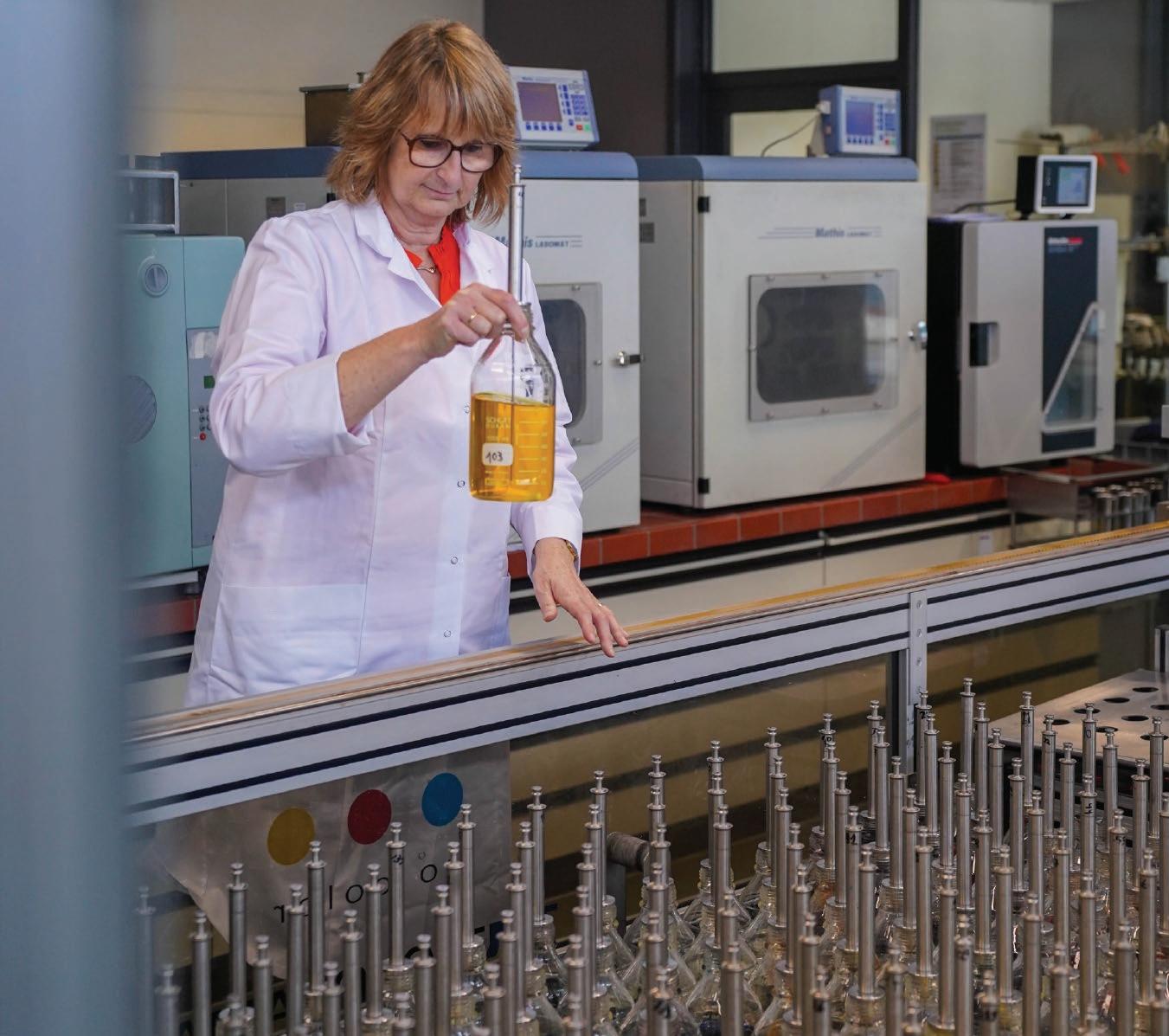












ASConcordia Textiles Group is a vertically-integrated technical textiles supplier committed to offering safe and sustainable material solutions. Marketing Manager Claudia Santeddu, Sustainability Manager Helena Vaesen and Global Sourcing & Supply Chain Manager at Purfi Jean-Baptiste Tuytens discussed innovative manufacturing processes. Report by Antonia Cole.
innovation, Marketing Manager Claudia Santeddu said: “In 2019, we began our joint venture with Purfi. This really accelerated the company, as it pushed sustainability forward into a key aspect of our business. Environmental preservation has become more prevalent in every industry and, in a sector that can be quite harmful, it is really important that we offer a sustainable solution with our fibre rejuvenation technology.”
Established in 1925, Concordia has almost 100 years of experience delivering high-quality
textiles that emphasise sustainability, comfort and protection. The company generates €120 million in revenue annually from specialised products for professional markets.
Concordia is headquartered in Belgium and has production facilities in Europe and Asia, as well as sales offices in China, Bangladesh, Germany and Spain. From sizing, warp beaming over weaving, knitting, dyeing and printing to finishing, coating and laminating fabrics, Concordia controls the entire manufacturing process. The company offers 2,000 different fabrics to customers, ensuring that each product meets specific requirements.
With a skilled workforce of 750 people, an in-house R&D department and an accredited testing lab, Concordia is prepared to develop innovative solutions that drive progress in the industry. The company is committed to sustainability and integrates environmentally friendly features into products, such as EVO coatings and PFC-free finishes.
“Over the years, we have grown significantly as a company,” added Ms Santeddu. “Now, we have the latest industrial equipment that allows us to produce the highest quality fabrics. Additionally, our focus on sustainability enables us to promote a healthy planet that benefits all stakeholders.”
Concordia is a company that constantly strives to evolve, which resulted in the addition of rejuvenated fibres from Purfi to the company’s product range. Purfi was
founded in 2019 and became operational in 2021. Since then, this joint venture has accelerated Concordia’s sustainability journey.
Purfi rejuvenates textile waste into quality virgin fibres. Therefore, the material can be reused in products for a variety of industries, combatting global waste challenges. The company transforms fibres through reverse spinning. This process works to facilitate a zero-waste supply chain.
“Concordia has always been focused on sustainable growth and offering new solutions to clients,” explained Global Sourcing & Supply Chain Manager at Purfi Jean-Baptiste Tuytens. “Purfi’s rejuvenation is very different from the typical recycling process because we use a specialised mechanical solution, as opposed to chemicals or shredding. We carefully open the textile waste so that


we don’t damage the fibre, we can retain up to 80% of the ength and strength of the original fibre.”
The fibres from Purfi’s process are also much purer as there are fewer contaminants. Thanks to the purity of the fibre, the spinning process will be much more efficient and 95% of the Purfi fibre will end up in the yarn, whereas with shredded fibres it is closer to 50%.
Purfi’s production pilotline is 150 metres long and the company can process between six and ten tonnes of material a day. This allows Concordia to make a substantial impact in promoting the circular economy.
“We work with materials like polyester and cotton, but also more technical fabrics for demanding applications such as firefighter or army uniforms,” continued Mr Tuytens.
“Purfi makes sustainability accessible to a broad range of industries that previously wouldn’t have that option.


“The circular economy is at the heart of what we do and, as other markets become more aware of environmental impacts, we want to support them in becoming more sustainable. We work on an industrial scale, producing 150 tonnes of recycledmaterial last year and are aiming to reach 1,000 tonnes next year.”
In addition to rejuvenated fibres, Concordia is also continuously exploring how to make coatings and finishes more sustainable. Typically, finishes include fluorocarbons (PFCs) as a durable water-repellent treatment. However, these chemicals are damaging to both humans and the environment.

Concordia Textiles has created products that are water-repellent, durable and PFC-free. Using innovative R&D developments, the company is able to produce materials that retain the functionality of PFCs and keep customers safe without using harmful chemicals.
“PFC takes a very long time to be broken down, which is what makes it so damaging to the environment,” commented Sustainability Manager Helena Vaesen. “We are always exploring new ways to limit the impact of our materials and taking those steps to reduce the amount of PFCs is making a huge difference.

There are always more improvements to be made, and we are working hard to make this progress, but what we’ve achieved so far is really setting a new standard for the industry.”
Concordia also utilises water-based coatings in designs instead of solvents like DMF. This is a much more sustainable option and significantly reduces environmental harm. Eventually, the company hopes to fully transition to using eco-solvents. Concordia is currently working to develop the facilities and technology to make the use of eco-solvents feasible on an industrial scale.
“This is one of the many environmental goals we are aiming towards,” added Ms Vaesen.
“With the introduction of CSRD regulations, it is important that we view sustainability as a continuously evolving mission. At Concordia, we always look for new opportunities to improve the sustainability of our operation and make significant progress every year.”
As Concordia has facilities across the globe, it is important for the company to adapt to the regulations of individual countries in terms of both the environment and working conditions. Being both ISO 14001 and ISO 9000 certified, the company is able to demonstrate environmental and quality standards.
By incorporating external audits and these certifications into operations, Concordia is able to identify areas for improvement and drive continuous progress. The company also recently obtained GRS certification, verifying high sustainability standards in recycled products.
“Every time new regulations or relevant certifications come along, we take the steps to adapt and incorporate better practices,” said Ms Santeddu, in conclusion. “We are a company based on innovation, which applies to both our product development and overall philosophy of growth. Not only are we researching our own sustainability and quality advancements, but we also look to the wider market and utilise industry knowledge where we can.”
Concordia’s objectives for the future are to keep minimising emissions and water usage, as well as using more renewable energy sources. The company will continue calculating its impact and taking the necessary steps to mitigate environmental harm. n




